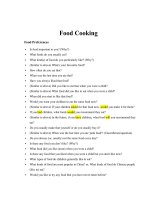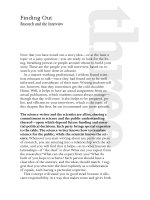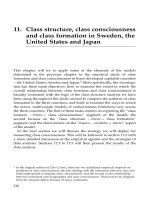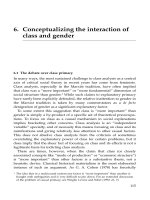Research method group5 class 9
Bạn đang xem bản rút gọn của tài liệu. Xem và tải ngay bản đầy đủ của tài liệu tại đây (104.08 KB, 15 trang )
HUE UNIVERSITY OF FOREING LANGUAGES DEPARTMENT OF
ENGLISH
RESEARCH METHOD
CLASS 9_GROUP 5
Instructor: Trương Thị Như Thủy
Group members:
1. Đinh Thị Hà
2. Phan Thị Duyên
3. Zơ Râm Thị Thanh Mai
4. Ka Phu Thị Thảo
5. Blúp Thị Viết
HUE, 2015
TABLE OF CONTENT
1.
2.
3.
4.
5.
6.
7.
8.
Acknowledgement
Abstract
Introduction
Methodology
Literature review
Findings and discussion
Implication
Conclusion
ACKNOWLEDGEMENT
It is our first experience of doing this research, so we coped with many difficulties.
We actually can’t finish it if we have no access to many helps. Firstly, we would
like to express our deepest grateful acknowledgement to Ms. Truong Thi Nhu
Thuy, our teacher concurrently our instructor, whose powerful encouragement,
helpful comment, valuable suggestion and clearly guidance help us open up the
orientation of this research and give us big motivations to finish our task. Secondly,
we want to utter many thanks to our subject, HUCFL second year English majored
students for their truthful answers and useful opinions to complete our
questionnaire. Moreover, we thank from the bottom of our hearts to predecessors
sharing their experience with us, which help us save time as well as avoid some
small but common mistakes. Last but not least, we are very much indebted to our
family and our friends who created favorable condition as well as encouraged us
much to do this research paper.
ABSTRACT
This topic is about HUCFL second year English majored students and their
learning speaking skills in groups. This topic is aimed at finding out their thought
about learning speaking skills in groups, the difficulties they coped with and
measures to make their learning speaking skills in groups more effective. To carry
out this topic, questionnaire method was used. There are sections in this research:
-
The introduction section will give you an overview of the research.
The literature review section will provide definitions and finding from other
researchers.
The methodology section presents the method used in this research.
The finding and discussion section contains the analysis of the data collected
from the questionnaires and interpretation.
The implication gives some suggestions to improve the quality of learning
speaking skills in groups for student.
The conclusion summaries the problem and point out some limitations of
this research.
INTRODUCTION
As English majored students, speaking-listening-reading-writing are four
compulsory and important skills for us. However, we think that speaking
is the most important skill because it requires regular practice and it is the
basic for other skills. And learning speaking skills in groups is necessary
to make much progress in this skill. This shows learning speaking in
groups is very important, which is the first motivation to encourage us to
choose this topic. In addition, learning speaking in groups is popular and
close to students. Therefore, they can find out interesting and useful
things that can help their speaking skills better. Finally, many students
approve of our topic and give sincerely their attitude so it is quite easy for
us to finish researching this topic.
LITERATURE REVIEW
I.The students’ opinions about learning speaking skill in groups
The use of group work in classroom activities is a method used for motivating
learning and increasing the idea of pleasure through learning. The current study
investigates the advantages of group work in exams in the English department, in
the College of Basic Education. 40 students in two classes of “The Introduction of
Phonetics and Phonology” participated in the study. They performed six tasks; two
prior to group work, two done in group work (by one group only) and two after
group work. The tasks were all practical, and they were based on phonetic
transcription. One of the groups participated in group work while the other did
not. This was done enable to compare the results. In addition to exam results, a
five-open-questions questionnaire on the students’ perception of group work was
distributed to the participants. Throughout the application of the study, the
instructor took notes of her observation of the formation of and participation in
group work. It was found that the students who worked in groups did not improve.
However, most students reported that they enjoyed the tasks and would like to
work in a group more often. The method of forming a group also seemed to affect
learning. When a student notices a conflict between her understanding and what
she hears from other group members through interaction, this forces her to
reconsider her concepts and restructure her ideas to conform to the group.
Added to that, shy students are more comfortable working in groups, they gain
more
confidence in their ability to learn; students benefit from sharing their backgrounds
and complement one another’s weakness (Payne & Monk-Turner, 2006; Wichadee,
2007; Badache, 2011). Highton (2006) argues that we can only learn by watching
how others think and learn differently from us and this takes place through
interaction. On similar grounds, Larcombe et al. (2007) evaluated a program for a
writing group at the University of Melbourne in Australia to specify the benefits of
developing the identity of thesis writers through group cooperation. They
concluded that the writing groups gave writers the chance to give and receive
feedback on their work and to develop their identity as thesis writers. Wichadee
reported that students benefited from group work in their reading comprehension,
for example, their reading skill improved, their interaction increased, they felt at
ease, learnt more, enjoyed their time and learnt how to work with one another.
Effect of group work on students’ learning was further discussed by Al-Sheedi
(2009), in Oman, who surveyed 240 Basic Education teachers’ opinions about the
effect of using group work to enhance students’ learning of English. Ninety eight
percent of the teachers believed that group work improved students’ achievement.
Also 98% agreed that students who work in groups learn more than those who
work individually. They all
agreed that group work is a useful technique to use in the classroom.
Group work technique has also proven to affect students’ attitudes towards
learning.
The use of group work in classroom activities has shown its usefulness in many
fields of education. Many studies reported better learning and improved level of
understanding, while others found group work to be useful in teaching
communicative skills and build better debate characteristics. The students who
worked in groups came early and were very enthusiastic towards working in a
group.
Link:file:///C:/Users/Administrator/Downloads/34343-125170-1-PB
%20(2).pdf
II. Difficulties in learning speaking skills in groups for language University
students.
Link:
/>ects/challenges.html ( time: 4.00 p.m,15/04/2015).
For students, there are some common challenges of group work in group. Firstly,
coordination costs represent time and energy that group work including the time it
take to coordinate schedule, arrange meetings, meet, correspond, make decisions
collectively, integrate the contribution of group members, ect. If coordination are
excessive or are not factored into the structure of group assignments, groups tend
to miss deadlines, their work is poorly integrated, motivation suffer, and creative
decline. Secondly, motivation costs refer to the adverse effect on student
motivation of working in groups. It is involve in free riding occurring when one or
more group members leave most or all of the work to a few, more diligent
members. Moreover, it is also about social loafing. It describes the tendencies of
group members to exert less effort than they can or should because of the reduced
sense of accountability. Next, conflict within a group can erode morale and cause
members to work withdraw. And the last, intellectual costs refer to characteristics
of group behavior that can reduce creativity and productivity. These include:
groupthink, escalation of commitment, transparency, transparency illusion,
common information effect.
III. Solutions for improving and raising University students’ speaking skills in
groups more effective.
Link: -simplesteps.html ( time: 3.45p.m, 15th April 2015)
/>ects/challenges.html ( time: 4.00p.m, 15th April 2015)
There are some measures to improve students’ speaking skills in groups more
effective. First, keep group small because working in a big group we will get
trouble in setting the meeting time. Therefore we should design some suitable
times for group meeting so that we can work effectively. And we have to set up a
clear schedule for the group to integrate parts. Second, speaking loudly and calling
attention to yourself and your friends. This help group members can understand
each other ideas to come to a conclusion. Third, avoid using idioms, slang and
mother tongue during the group working time. It not only wastes time but also
makes the other members can’t catch up with your mean. Last but not least is
fixing mistakes straight. We hope that these measures will be useful for you.
QUESTIONAIRE
Which is your opinion about learning speaking in groups?
Boring.
C. Compulsory.
Useful.
D. Interesting.
2. Indicate the effectiveness of learning speaking in groups you get by circling
one of the following:
A. 0%
C. Over 50%
B. About 50%
3. Rank the following from 1 to 3 in order of preference:
_ The part you like best in speaking in groups is
1.
A.
B.
....... exchanging ideas.
....... correcting mistakes.
....... speaking in front of many people.
4.
5.
6.
How often do you practice speaking in groups per week:
A. 0
C. 2 times
B. 1 time
D. 3 times
Circle one of the following to indicate your attitude to the following
statement
- Learning speaking in groups is effective:
A. Strong agree
C. Neutral
B. Agree
D. Disagree
E. Strong disagree
Rank the following from 1 to 4 in order of
- The most common of obstacle you get in
preference:
learning speaking in groups
........ coming late.
........ having different ideas.
........ being unenthusiastic.
......... having a disparity in personal ability
7.
Which factor makes your learning speaking in groups effectively
A. Learning space
C. A good leader
B. Studying equipments
Circle one of the following to indicate your attitude to the following
statement
- You have more outdoor activities( talk with foreigners, make
investigations,.....) by learning speaking in groups:
A. Strong agree
C. Neutral
B. Agree
D. Disagree
E. strong disagree
8.
Rank the following from 1 to 3 in order of preference
To help groups’ members be more friendly, the most practical thing we
should do is:
9.
........ noshing together.
........ making a small talk before working.
........ having relaxed time to play together.
Which is your opinion about an ideal group
A. Having a scientific schedule.
B. Being active and creative.
C. Expressing ideas straight.
11. What are some profits you make on learning speaking in groups?
...........................................................................................................................
...........................................................................................................................
...........................................................................................................................
..............................................................................................................
10.
FINDINGS AND DISCUSSION
1.
According to the survey, there were 56 % of HUCFL second-year English
majored students said that learning speaking in groups was interesting. 9 out
of the total 25 students( which accounted for 36%) said that it was useful to
learn speaking English in groups for them, and 4% students said that it was
compulsory.
2.
The majority of students ( accounted for 80%) said that the effectiveness of
English speaking in groups they got by over 50%. The remaining students
said that they only got about 50% effectiveness in speaking English in
groups.
3.
Exchanging ideas: 44% of them thought that it was the first one,28% of them
thought that it was the second one and the last percent chose that it was the
third one. Correcting mistakes: there were 20% of them thought it was the
first one, 36% thought it was the second one, 44% of them thought it was the
third one. Speaking in front of many people: there were 36% of them thought
it was the first one, 36% of them thought it was the second one and 28% of
them thought it was the third one.
4.
The survey shows that there were 44% HUCFL second-year English majored
students often practice speaking English in groups 1 time per week.
Moreover, there were 28% the students who often practice 2 times, 28%
students often spent 3 times for praticing and no one didn’t practice.
5.
Approximately 28% of them chose A, 68% of them chose B, 4% choose C
and no one chose D. This mean that the majority of them agreed that “
learning speaking English in groups is effective” and no one denied this.
6.
Coming late: 32% of them thought that it was the first common of obstacle
they got, 4% of them thought it was the second one, 16% of them thought it
was the third one, half of them thought it was the fourth one. Having
different ideas: 36% of them thought that it was the first one, 16% of them
thought that it was the second one, in the order of 30% of them thought that it
was the third one, 1-fifth of them thought it was the fourth one. Being
unenthusiastic: 1-fifth of them thought it was the first one, 36% of them
thought it was the second one, 36% of them thought it was the third one and
8% of them thought it was the fourth one. Having a disparity in personal
ability: 12% of them thought it was the first one, 44% of them thought it was
the second one, one-fifth of them thought it was the third one and closed to
quarter of them thought it was the fourth one.
7.
The majority of them agreed that the factor which make learning speaking in
groups effectively was the studying equipments- it took 28%. And 64% the
others thought that a good leader was the factor making learning speaking in
groups effectively. Having the least percent 8% was the learning space.
8.
“ We have more outdoor activities by learning speaking in groups”. There
were 44% students agreed with this statement, 28% of them strong agreed
with this and 16% students thought that this was neutral. The minority of
them disagreed with this – 12%.
Noshing together was the answer that most of them chose to make group
members be more friendly over 70%. Besides, they wanted to make a small
talk when they learn speaking in groups (accounted for 20%). The last
percent was having relaxed time to play together.
10. The result shows that there were over 80% students chose being active and
creative. In addition, their ideas about an ideal group was expressing ideas
straight that accounted for 12%. The last choice which 4% was having a
scientific schedule.
11. Most students said that learning speaking skills in groups has a lot of
advantages. First, they can exchange their ideas with each other. Second, they
9.
can be confident to communicate in public. Moreover, they can correct
mistakes themselves. Finally, this help them know about their friends.
IMPLICATION
According to our survey, we have received many different ideas about learning
English speaking skills in groups. From that we learn some conclusions and we
give some measures to help students with their obstacles. First of all, most of
students practiced speaking English in groups once a week, we think this is too few
so that they can speak well. Therefore, they should spend more time for practicing.
Second, the majority of students realized that having different ideas was the most
common obstacle they got, but we think it isn’t a problem if every group member
listens to and respects others’ ideas, then they choose the best idea. Last, during the
studying time, group members should be active, don’t be shy and exchange ideas
confidently. All of these things will help studying English speaking in groups as
well as your speaking skill be more effective.
CONCLUSION
Today, studying in groups is a very popular method for student. Special for
HUCFL students because this method will help them to correct mistakes
themselves. Therefore, it is so essential. However, most of students think that they
just join without contributing their ideas. And this is the case of HUCFL secondyear English majored students, too. That is the reason which stimulates us to study
the topic: “ HUCFL second-year English majored students and learning speaking
skills in groups”. This research aim to raise students’ awareness of the importance
of learning speaking skills in groups. During the research , we got some obstacles
and of course we made some mistakes. From that, we can learn many useful things
for our future research. We hope that there are some people who are keen on this
topic will make the topic be more insightful.









